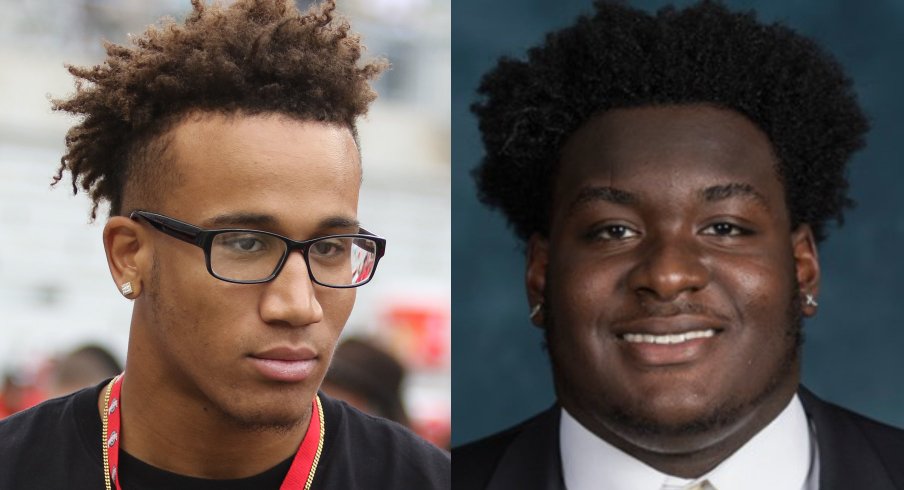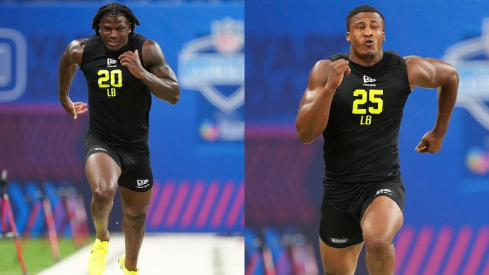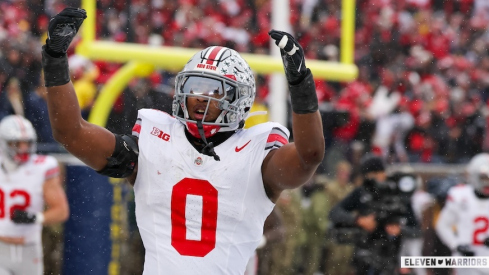Ohio State and Michigan each had players transfer to Cincinnati and seek immediate eligibility this offseason – to wildly different results.
Former Buckeye receiver L'Christian "Blue" Smith transferred from Ohio State to Cincinnati and received immediate eligibility without a hiccup, with Bearcats head coach Luke Fickell praising Ohio State for its assistance in the process and the NCAA for valuing mental health.
"To me it's good news for the NCAA, just being smart about what they're doing and making sure mental health is important to them," Fickell told the Fletcher Page of the Cincinnati Inquirer. "I'm happy for what Ohio State did for us and for Blue, really trying to help him out and make this possible."
Ohio State did more than just cooperate with Smith's transfer request. According to Justin Williams of The Athletic ($), Ohio State actually submitted the waiver on Smith's behalf, along with supporting medical documentation.
By all accounts, Smith's transfer and eligibility waiver process was relatively painless and free of any controversy. Former Michigan offensive lineman James Hudson had no such luck, to say the least.
Hudson's waiver was based on mental health issues – so were Smith's, as Fickell's statement implies – and it was denied by the NCAA because he "never spoke up about (his) mental struggles to administration at the University of Michigan," according to his social media statement.
#Bearcats I need your support!! @GoBearcatsFB pic.twitter.com/iN033gBk8P
— James Hudson III (@__BallisLife2) May 14, 2019
Williams reports – while acknowledging a lack of cooperation on Michigan's part – that the main reason for the denial was that Hudson "didn’t meet the NCAA’s specified directives for an assertion of student-athlete injury or illness," likely because there was no medical documentation from his time at Michigan since he "never spoke up" about the mental health struggles.
Still, Michigan does not appear to have made the request any easier with its lack of cooperation, and the controversy around Hudson's eligibility decision certainly didn't die there.
A few months later, Michigan head coach Jim Harbaugh appeared to question the legitimacy of Hudson's mental health concerns, suggesting that players could lie about mental health issues to gain immediate eligibility.
From Harbaugh's ESPNU radio appearance, as transcribed by Nick Baumgardner:
"And the other piece that bothers me about it is, the youngster that says 'this is a mental health issue, I'm suffering from depression.' Or that's a reason to get eligible. And once that's known that 'hey, say this or say that' to get eligible. The problem I see in that is that you're going to have guys that are, 'OK, yeah, I'm depressed. I have mental (health issues). They're going to say what they've got to say. But then down the road, I don't see that helping them if that's not a legitimate thing and nobody would know."
Harbaugh's comments, ironically, came just hours after he said he supported a one-time transfer for all student athletes without requiring them to sit out a year.
Regardless of his intent or whether his comments were truly directed towards Hudson, they were not well received and prompted critical comments from Hudson's mother.
Glenda Hudson was upset when she heard Jim Harbaugh's comments on mental health today. Her son, James, left Michigan and claims the NCAA is blocking his immediate eligibility at Cincinnati because he never reported issues at Michigan. For the first time, she's speaking out: pic.twitter.com/9nTjTbs8wP
— Jordan Strack (@JordanStrack) July 20, 2019
While it's impossible to know for sure how Michigan handled Hudson's process at the administrative level, all of this seems to suggest Michigan was less than cooperative.
Chad Brendel of 247 Sports wrote that Hudson had his eligibility waiver denied "in part due to a lack of cooperation from the Michigan head coach and their athletic administration," and both Hudson and his mother seem to believe Michigan had a role in blocking his immediate eligibility.
— James Hudson III (@__BallisLife2) July 19, 2019
This is not an approach Ohio State has taken, or plans to take in the future. Ohio State athletic director Gene Smith said that in most cases, Ohio State will not stand in the way of a player wishing to transfer and seek immediate eligibility elsewhere.
"Our job is to make sure we create that environment where they made the right choice when they came here, and then they don’t want to leave,” Gene Smith told Eleven Warriors. “If they’re bumping up against playing time, and this is legit and you see it, and they’re not going to have that opportunity and everything else is good, and they want to go, let them go.
“Now it’s harder if they’re transferring in-conference, and you might play against them next week. But the thing that we can’t do is say every case is the same. Every case is different. And you got to look at it on its own merits.”
And by all accounts, Ohio State appears to have followed through on that.
Ahead of last season, Trevon Grimes (Florida), Antonio Williams (North Carolina) and Jack Wohlabaugh (Duke) all received their immediate eligibility waivers. This year, Tate Martell (Miami), Blue Smith (Cincinnati) and Keandre Jones (Maryland) all received their waivers.
“If they’re bumping up against playing time, and this is legit and you see it, and they’re not going to have that opportunity and everything else is good, and they want to go, let them go.”– Ohio State Athletic Director Gene Smith
Even in the cases Gene Smith alluded to where a player wishes to transfer to a future opponent, Ohio State appears to have been cooperative, with Blue Smith gaining his immediate eligibility at Cincinnati (Ohio State's Sept. 6 opponent), and Jones getting the same at Maryland (Ohio State's Nov. 9 opponent).
The notable exception appears to be quarterback Matthew Baldwin, who transferred to TCU in the spring and recently had his waiver denied. However, the NCAA updated its transfer waiver guidelines in June to increase the requirements for players to receive a waiver and Baldwin's request reportedly fell under the updated guidelines where the others did not.
Ohio State has also been on the receiving end of similar cooperation from another program as Gene Smith recently praised Georgia for working swiftly with Ohio State regarding transfer quarterback Justin Fields' eligibility case.
It's worth noting eligibility decisions are still pending for two other Michigan transfers – Oliver Martin at Iowa and Aubrey Solomon at Tennessee – and we have no indication about Michigan's role or cooperation in those cases.
The transfer market isn't going anywhere, and from both a point of view that favors the well-being of a student-athlete as well as just a broader public relations perspective, it seems more beneficial to fully cooperate as players make those decisions than to stand in the way.
Ohio State and Michigan have both helped demonstrate that point in very different ways.


